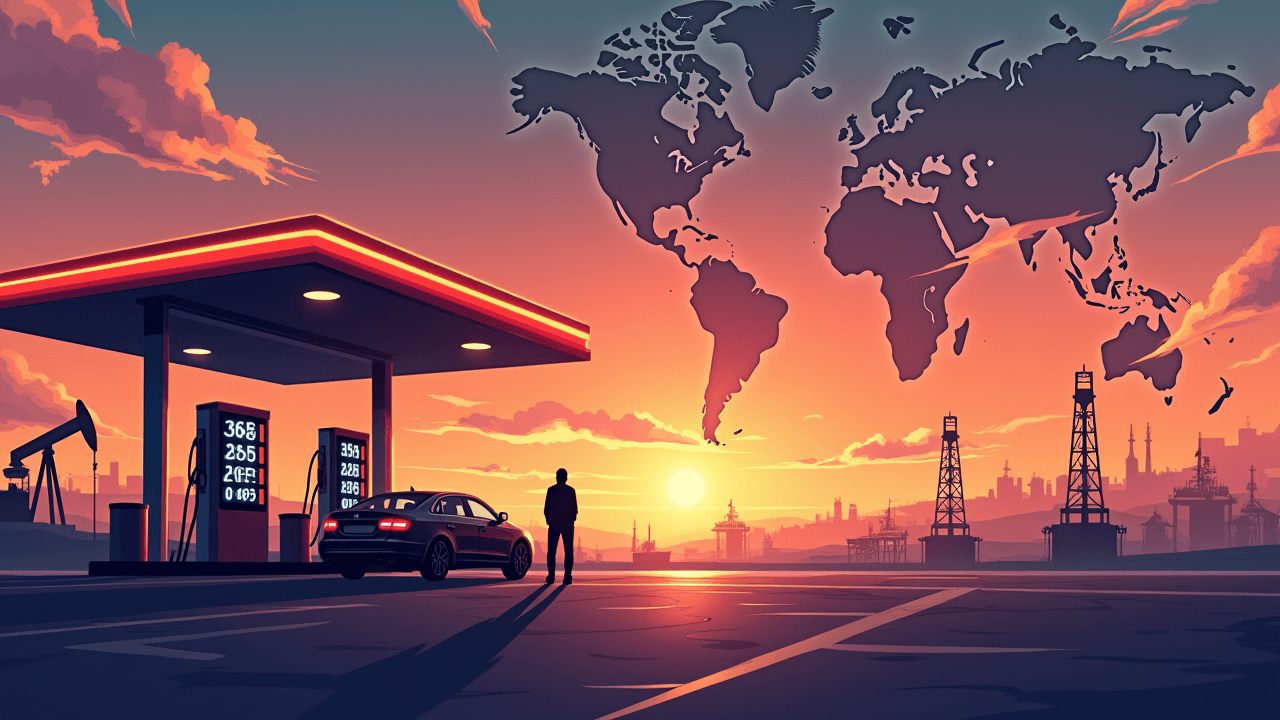Ever get totally baffled by why gas prices seem to have a mind of their own? I know I do, and it looks like we’re not alone. Someone recently asked, “Why does gas fluctuate prices so much from day to day? Why don’t they have a set price like how most goods are?” So that’s our deep dive today, getting to the bottom of this gas price mystery. And trust me, this isn’t just surface-level stuff. We’re going deep beyond the basic economics to the less obvious reasons gas prices are such a puzzle.
Luckily, I’ve got just the person to untangle this: our resident expert on all things market forces. They’re basically like the Sherlock Holmes of supply and demand. So buckle up.
Understanding the Mystery of Fluctuating Gas Prices
Well, let’s just say the mystery of fluctuating prices never gets old for me, right? I mean, this question is so relatable. Think about it. Most things we buy, the price is the price. It’s not changing constantly.
One friend used a term that I think nails it: inelastic demand. I’ll admit, I had to look that one up myself. But basically, we need gas, even if the price goes bonkers, like last summer. Remember those insane gas prices? We all complained, but we still filled our tanks. I even tried biking to work a few times, but, well, let’s just say my usual commute is way easier on four wheels.
You’ve hit on something crucial there. Short term, people will pay more for gas because they kind of have to. It’s not like switching cereal brands because the price went up. Driving is often tied to work, family, daily life. Of course, there’s a limit. If gas tripled overnight permanently, people would adjust, but that’s major life upheaval, not a quick decision.
Totally. It’s like that time we actually did change our vacation plans because of gas prices. We thought, “Hey, let’s explore closer to home this year.” And you know what? It turned out amazing. Found this awesome little beach town I never even knew existed. So there’s a tipping point. Prices do change behavior, but it takes something huge usually.
Technology and Gas Price Fluctuations
You know those digital signs at gas stations? Don’t they kind of mess with your head? It’s like blink, and the price is different. Makes me wonder, is that part of why it fluctuates so much, like it’s so easy to change?
Now, it’s true, technology has made it faster, but remember the old flip signs? Even then, stations could change prices pretty quick—those numbers on a track. Prices jumped around back then too. It’s not the sign itself. It’s that gas stations have to react fast to a market that moves fast. And to get that, we’ve got to talk about gasoline as a commodity.
Gasoline as a Commodity
Ah, yes, the commodity thing. Econ 101 is a bit fuzzy for me these days. Break it down. Why does that matter for gas prices?
Think of it this way: a gallon of regular at one station is pretty much identical to the gallon across the street. It’s not like Coke versus Pepsi, where maybe you’re loyal to one brand. With gas, we want the cheapest, which means fierce competition.
Makes sense when you put it like that. Speaking of cheap gas, how about places like Costco? How do they always seem to have lower prices? What’s the deal there?
Costco is a perfect example of strategy with gas prices. They’re not trying to make bank off the gas itself. It’s about getting you in the door to buy, you know, the giant everything—pretzels, bulk stuff. It’s called a loss leader, a classic tactic.
The Loss Leader Strategy
Loss leader? Okay, now that sounds sneaky but brilliant.
It is clever. You offer one product—in this case, gas—super competitive, even if you lose a tiny bit on it. The bet is the extra customers more than make up for that loss by buying other things. And people do love a bargain. We’ll go out of our way, even deal with a crazy Costco parking lot.
So true. They’re basically luring us in with the cheap gas, then it’s bulk buying time. Guilty as charged. I’ve fallen for it. But that still doesn’t explain those initial price swings. Why does it seem to jump at the slightest thing?
The Impact of Crude Oil Prices
One reason is that it all comes down to crude oil, right?
You got it. Crude oil is the start. But here’s the kicker: that market is highly sensitive to, well, everything going on in the world. It’s like this web of supply, demand, global stuff happening, economic predictions, even just people guessing what’ll happen with prices.
Okay, now this is where I need the “explain like I’m five” version.
Picture it like this. On one side, you’ve got the basics: how much oil is there, how much do people want. Big storm in the Gulf of Mexico, some country suddenly produces less oil, or war breaks out—any of those, prices can spike. Then, flip side, bad economy, people buy less, prices drop. But it’s not just real-time stuff. There’s futures trading—investors basically betting on future oil prices, like gambling but on oil instead of a sports team. Adds a whole other level of, well, unpredictability to it all.
The Journey of Gasoline Prices
So we’re not just paying for the oil itself, but the whole journey it took to get to my gas tank, which has its own ups and downs. That makes sense. But it still doesn’t explain why prices change seemingly instantly. I mean, the gas we’re pumping at a station was probably bought by the station weeks ago, right? So why the sudden hike?
Excellent point, and it gets to how gas stations work. They’re not just reacting to now; they’re trying to guess the future too, like economic fortune tellers or something.
Kinda. Remember those global events? Let’s say a hurricane in the Gulf, potential oil disruption. Even if it hasn’t hit yet, gas stations know it might, so prices go up, even if the oil they have was cheap. Same logic for refineries, transportation costs. Refinery shuts down, trucking fuel gets pricier—that all hits the pump eventually. Always staying ahead of the curve, that’s the game.
The Balancing Act of Gas Stations
So it’s not that gas stations are being mean or just making up prices, more like they’re in this high-stakes chess match.
Exactly. They need to cover their costs, make some profit, but also have enough gas so people don’t freak out. And don’t forget intense competition. One station too high, everyone goes across the street to the cheaper one. Talk about pressure.
But hold on, don’t gas stations make a bunch of money from the stuff inside—snacks, drinks, sometimes they have surprisingly decent food, gotta admit. Doesn’t that affect how they price gas? I mean, who hasn’t grabbed a soda and chips after filling up, even if they didn’t need it?
Inside Sales and Gas Pricing
So it’s all about the snacks and drinks then, huh? Figured those played a part.
Well, it’s not quite that simple. Those inside sales, yeah, they matter big time for gas stations, but they still got to buy the gas in the first place, and that cost, as we’ve learned, is totally unpredictable. Plus, they’ve got to have enough to sell. Imagine you pull up, desperate for gas, and the pump’s bone dry—the worst, not a good look for business. So it’s a balancing act: price too high, everyone goes to your competition; price too low, you run out, lose money, and tick off customers even more. Talk about a tightrope walk.
High price, low price, and on top of it all, the cost of the gas itself is all over the place. This has been seriously eye-opening.
Frequently Asked Questions
Why do gas prices fluctuate so much from day to day?
Gas prices fluctuate due to a combination of factors, including changes in crude oil prices, global supply and demand, geopolitical events, and market speculation. Gas stations react quickly to these changes to stay competitive and cover their costs, leading to frequent price adjustments.
What is inelastic demand, and how does it affect gas prices?
Inelastic demand refers to a situation where consumers will continue to buy a product despite price increases. Gasoline is considered inelastic because people need it for daily activities like commuting to work and running errands. This means that even when prices rise, demand doesn’t drop significantly in the short term, allowing prices to fluctuate more freely.
How do global events impact the price of gasoline?
Global events such as natural disasters, political unrest, or production changes in oil-producing countries can affect the supply of crude oil. Since crude oil is the primary input for gasoline, any disruptions can cause oil prices to spike, which in turn leads to higher gas prices at the pump.
Why do gas stations change prices even if the gas they have was bought at a different price?
Gas stations adjust prices based on current market conditions and anticipated future costs. If they expect the price of replacing their current fuel stock to increase due to market trends, they may raise prices now to cover those future costs and maintain profitability.
How do gas stations use inside sales to influence gas pricing?
Gas stations often use a “loss leader” strategy, offering gasoline at very competitive prices to attract customers into the store. Once there, customers may purchase higher-margin items like snacks and drinks. While inside sales contribute to overall profits, gas stations still need to price fuel carefully to manage supply and remain competitive.
Your Hosts

Alex & Maria
Join Alex Thompson and Maria Davis as they navigate the fascinating world of knowledge. With their combined expertise and passion for learning, they simplify the complex and make every episode a journey worth taking.

